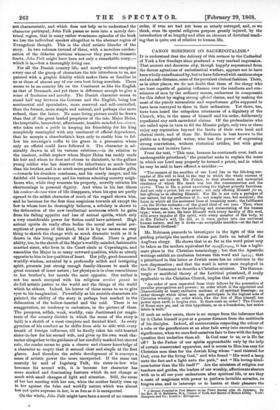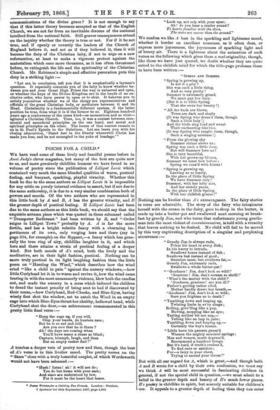CANON ROBINSON ON SACERDOTALISM.* IT is understood that the delivery
of this sermon in the Cathedral of York a few Sundays since produced a very marked impression. That ancient and decorous city, though happily sequestered from the fiercer agitations of ecclesiastical warfare, appears not to have been wholly uninfluenced by, but to have followed with cautious steps
and at a safe distance, some of the prevalent clerical fashions. There, as is other places, we do not doubt that those of the clergy who are least capable of gaining influence over the intellects and con- sciences of men by the ordinary means, endeavour to compensate for this defect by urging strong official claims, and by making the most of the purely miraculous and superhuman gifts supposed to
have been conveyed to them in their ordination. Yet there, too, have been heard the outspoken utterances of a dignitary of the Church, who, in the name of himself and his order, deliberately repudiated any such sacerdotal claims. Of the prebendaries who are called upon in turn to fill the Minster pulpit, only two or three enjoy any reputation beyond the limits of their own local and clerical circle, and of these Mr. Robinson is best known to the public as a thoughtful writer, who has the power of expressing strong convictions, without rhetorical artifice, but with great clearness and incisive force.
From the text, "This man, because he continueth ever, hath an unchangeable priesthood," the preacher seeks to explain the sense in which our Lord may properly be termed a priest, and in which he may be said to have offered a sacrifice :—
" The essence of the sacrifice of our Lord has in the life-long sur- render of His will to God, in the way in which the whole current of His being set towards His Father, in that absolute and unwearied obedience of which His death was but the consummation and the crown. Thus is He a priest exercising the highest priestly functions. And not only a priest, but our priest: not only offering Himself for us, but offering us in offering Himself. For He is not only a partaker of our nature, but the perfection of it : not simply man, but mankind; the focus in which all the scattered lines of humanity meet; the fulfilment —in the Divine estimate—of the grand ideal of our race. Thus, when He became man, it was the perfecting and consecrating of the human type ; when, as man, He bent Himself with every faculty of His soul, with every impulse of His spirit, with every member of His body, to do His Father's will, He did, as it were, gather into one universal human nature, and lay it down—an acceptable sacrifice—at the feet of the Eternal Godhead."
Mr. Robinson proceeds to investigate in the light of this one guiding principle the modern claims put forth on behalf of the
Anglican clergy. He shows that in so far as the word priest may be taken as the modern equivalent for crpsap67Epo;, it has a legiti- mate place in the Christian terminology ; but that the Apostolic writings exhibit no confusion between this word and lEpELc ; that a priesthood in this latter or Jewish sense has no existence in the new dispensation ; and that the word is never once employed in the New Testament to describe a Christian minister. The thauma- turgic or sacrificial theory of the Levitical priesthood, if really
applicable to the Christian Church, implies that we still possess
"An order of men separated from their fellows by the possession of peculiar prerogatives and powers ; an order which is the appointed and (theoretically at least) exclusive medium of all spiritual blessings; an order through which alone men can participate in the highest acts of Christian worship; an order which, like the Son of Man himself, has power upon earth to forgive sins. Is there such an order? The Church of Rome says yes, and on this hypothesis, as on a foundation, her entire fabric is built."
If such an order exists, there is no escape from the inference that by it Christ himself is put at a greater distance from the multitude of his disciples. Indeed, all controversies respecting the colour of a robe or the genuflexions at an altar fade away into exceeding in- significance, when we once find ourselves face to face with the deeper question that underlies them all. Is God near to us, or is He far off ? Is the Father of our spirits approachable only by the help
of certain consecrated apparatus, and is access to Him less easy for Christian men than for the Jewish King whose " soul thirsted for God, even for the living God," and who found " His word a lamp unto the feet and a light unto the path," and " His loving-kind-
ness better than the life itself ?" Are the ministers of religion our teachers and guides, the leaders of our worship, affectionate sharers with us in all our poor endeavours after spiritual life, or are they a caste of magicians with power to perform invisible miracles, to forgive sins, and to intercept or to hasten at their pleasure the
• A Sermon Preached in York Minster on the Third Sunday after the Epiphany. By the Rev. H. G. Robinson, M.A., Canon of York, and Rector of Bolton Abbey. York: Sampson and Co; London: Rivingtons.
communications of the divine grace ? It is not enough to say that if this latter theory becomes accepted as that of the English Church, we are not far from an inevitable divorce of the national intellect from the national faith. Still graver consequences attend on the inquiry whether the theory is true or not. For if it be not true, and if openly or covertly the leaders of the Church of England believe it, and act as if they believed it, then it will become the duty of the Christian laity, if not to urge on a new reformation, at least to make a vigorous protest against the materialism which once more threatens, as it has often threatened before, to extinguish the life and the spirituality of the Christian Church. Mr. Robinson's simple and effective peroration puts this duty in a striking light :—
" Let me, in conclusion, tell you that it is emphatically a layman's question. It especially concerns you of the laity to know whether be- tween you and your Great High Priest the way is unbarred and open, or whether the keys of the Divine Kingdom are in the hands of an ex- clusive order, who have power to open or to shut. It behoves you to satisfy yourselves whether we of the clergy are representatives and officials of the great Christian body, or mediators between it and its Head. Christianity is a fundamentally different system, if the latter position be true, from what it is if the former be so. Eighteen hundred years ago a controversy of the same kind—as momentous and as vital— agitated a Christian Church. Then, too, it was a contest between cere- monial and sacerdotal principles on the one hand, and moral and spiritual principles on the other. The issues of that contest remain to us in St. Paul's Epistle to the Galatians. Let me leave you with his closing admonition, Stand fast in the liberty wherewith Christ has made you free, and be not entangled in the yoke of bondage.'"































 Previous page
Previous page